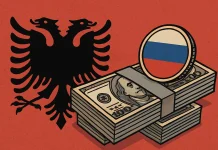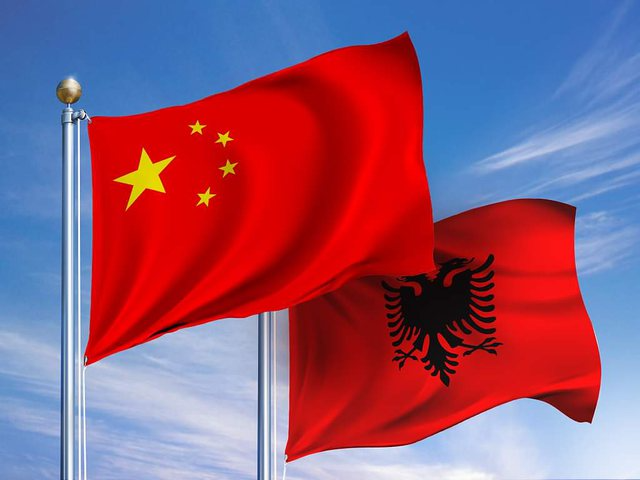Ben Andoni
The continuous postponement of the deadlines for the 2023 Census has raised significant concerns within the Albanian community about the results. The opposition has raised accusations of data manipulation, while minorities and religious communities have voiced concerns about the new demographic stratification of their groups. Finally, INSTAT released the 2023 Census data on June 28th, revealing that Albania now had 2.4 million residents, approximately 400,000 fewer than in 2011.
The results were disappointing across all demographic categories. Notably, the 2023 Census produced some ‘interesting’ findings regarding minorities in Albania. Out of the exact population of 2,402,113 residents in our country, 23,485 identified as Greek minorities, which is a decrease compared to 2011, when 24,243 individuals declared themselves as such (INSTAT, 2024).
The Macedonian community has experienced the most significant decline, with its population halved. Currently, there are 2,281 Macedonian minorities in the country, down from 5,512 in 2011. For the first time, the Census also recorded the Bulgarian and Bosniak minorities, with figures showing 7,057 Bulgarians and 2,963 Bosniaks. The notably higher number of Bulgarians compared to Macedonians has sparked accusations of data manipulation from the Macedonian Alliance for European Integration (MAEI).
The reaction from Albania’s Macedonian community was immediate and expected. ‘The Macedonian Alliance for European Integration (MAIE), the only party representing the interests of the Macedonian community in Albania, expresses its dismay and rejection of the 2023 Census results, stating that the figures for the Macedonian minority have been manipulated and falsified. The population registration process was neither fair nor transparent, and it did not comply with international standards or those of Eurostat,’ they officially declared.
The Ministry of Foreign Affairs of the Republic of North Macedonia also expressed concern over the 2023 census data from Albania, citing the ‘publication of preliminary figures that, unfortunately, do not adequately reflect the true number of ethnic Macedonians in the country.’ The Ministry in Skopje further voiced displeasure with the use of the term ‘North Macedonians.’
Meanwhile, the ‘Prosperity Golloborda’ association reacted with enthusiasm to the results. Its chairman, Haxhi Pirushi, expressed great joy over the 2023 Census outcomes: ‘Our organization was established on May 5, 2000, to affirm and protect the inherited Bulgarian language. Our state—the Assembly, the Government—made a historic decision, something unprecedented, as this right had not been recognized since 1938, when it was acknowledged but never implemented,’ he told to Faktoje.
Despite this, the North Macedonian community’s protests and indignation have not stopped. ‘In the 11 censuses conducted in Albania over the past 100 years, no resident has identified as Bulgarian. No international monitoring report, including those by organizations like the Council of Europe that oversees the Framework Convention for the Protection of National Minorities, has ever documented the presence of a Bulgarian minority in Albania. Even the First Report on National Minority Rights by the Ombudsman from 2015 did not recognize a Bulgarian minority in Albania,’ stated MAEI Chairman Vasil Steriovski to Faktoje.al
Two Christian communities in the country have also expressed dissatisfaction with the census results. The 2023 Census reported that 4 percent of the population identified as atheists: 1.1 million were declared Muslims, 200,000 Catholics, 174,000 Orthodox Christians, and 116,000 Bektashis. The Catholic Church, after reviewing the results and noting a decline among its members, admitted it could not confirm whether the reported number of Catholics in Albania was accurate. The Orthodox Church was more outspoken and critical, labeling the 2023 Census results for Orthodox Christians as not reflecting reality.
Although there have been concerns about the numbers for the Greek minority and religious communities, which are somewhat justified, the North Macedonian community’s issues have been more prominent compared to those of the Bulgarian community.
The conflict between Albanian communities of closely related ethnicities is not coincidental. Bulgaria and North Macedonia have been in major disagreement since the latter’s separation from the former Yugoslavia, which, unlike other republics, separated without armed conflict. Their disputes have involved issues of identity, language, and history, and have intensified in recent years with Bulgaria’s continued veto against North Macedonia’s EU membership.
In 2017, the Albanian Parliament, with consensus among the main political forces, adopted the law ‘On the Protection of National Minorities in the Republic of Albania.’ Under this law, the recognized national minorities in Albania are the Greek, Macedonian, Aromanian, Roma, Egyptian, Montenegrin, Bosniak, Serbian, and Bulgarian minorities.
At that time, Bulgarian Prime Minister Boyko Borisov described Albania’s recognition of the Bulgarian minority as a historic milestone for Bulgaria: ‘After 104 years, Albania has recognized the Bulgarian ethnic community. This achievement is the result of extraordinary efforts by Bulgarian diplomacy to defend the rights of Bulgarians outside our borders.
Following the approval, Borisov, in his post, also offered special thanks to Albanian Prime Minister Edi Rama, who, according to Borisov, fulfilled his promise to safeguard the interests of the Bulgarian community in Albania.
‘Although the draft law submitted to Parliament by the Ministry of Europe and Foreign Affairs initially proposed recognizing eight existing national minorities (Greeks, Macedonians, Aromanians, Serbs, Montenegrins, Bosniaks, Roma, and Egyptians), at the last minute, Albania was pressured by Bulgaria, which used its EU membership veto. This led to the recognition of a non-existent Bulgarian minority in Albania. We, as the Macedonian minority, reacted strongly, arguing that the recognition of a non-existent Bulgarian minority would effectively constitute a form of genocide against the Macedonian minority as Bulgaria seeks to establish minority status in areas where the Macedonian minority resides along the Albanian-Macedonian border. We also pointed out that Bulgaria would exploit its EU membership to further its goal of assimilating the Macedonian community in Albania and creating a fictitious Bulgarian minority,’ MAEI Chairman Vasil Steriovski responded to Faktoje.al.
While the North Macedonian minority in Albania has reacted strongly, the government of North Macedonia has been more measured in its response. Apostol Simovski, Director of the State Statistical Office of North Macedonia, remarked that the identification of some of the Albanian population as Bulgarian during the census was the result of significant Bulgarian efforts. He did not view this as a failure on Albania’s part but noted that the census might need to be revisited. ‘In any country where ethnic identity data is collected, this information should reflect the free will of the individual providing it,’ Simovski stated.
In contrast, the Bulgarian minority considers the outcome a success. ‘I began working on this issue in 1993. Officially, I achieved results in 2000 through a court decision… Denying our identity is an anti-historical and false mistake, leading to inaccurate conclusions,’ said Haxhi Pirushi of the ‘Prosperity Golloborda’ association in response to Faktoje.al.
The recent handling of this minority issue is closely linked to Bulgaria’s European path. The efforts of some minority members, known as Gorani (though identified by Albanians as descendants of the Bogomils), to obtain Bulgarian passports increased significantly after Bulgaria joined the EU. The nine villages in the Gora region in the northeastern part of the country are inhabited by people who speak a Slavic language similar to Macedonian, believed to have settled there between the 11th and 13th centuries, during a time when Bulgaria was influenced by the Bogomil movement, which the locals refer to as ‘the beloved of God.’
The truth is that since the 1990s, the community has been frequently approached with offers of Balkan citizenship. In the early ’90s, Serbs attempted, without success, to establish Gora as their minority in Albania. Macedonians went a step further by offering passports to the Gorani. However, it was only the Bulgarians who succeeded in integrating them into their interests. The issue was brought to the forefront by Albanian media in 2015, focusing on the villages of Shishtavec and Zapod to highlight the high rate of departures from Albania and asylum applications to EU countries. The new Bulgarian passports proved highly advantageous for many residents, even those who were not Gorani but spoke the language, enabling them to start new lives in the West—often in much better conditions than the thousands of Albanians who ended up in asylum seeker camps (Ibid). It is noteworthy that today, Bulgarian passports grant visa-free access to 171 countries.
Reflecting on history, the void left by Bulgarian policy during the communist era, combined with the policies of former Yugoslavia and the state-building process of North Macedonia, has become increasingly apparent since the 1990s, resulting in heightened tensions between Sofia and Skopje.
‘The law did not specify where this minority resides in Albania, but Bulgaria, leveraging this law, extended its influence into regions traditionally inhabited by the Macedonian minority: Prespa, Golloborda, Gora, and the village of Vernik in the Devoll area. After the ‘recognition’ of the Bulgarian minority, Sofia began a robust campaign to undermine and assimilate the Macedonian minority in Albania. Bulgaria organized free monthly trips for young people from Gora, Golloborda, Prespa, and Vernik. It offered scholarships for studies at Bulgarian universities, as well as for postgraduate and doctoral programs. The Bulgarian Embassy set up associations and funded various projects in areas where Macedonians traditionally live. Various Bulgarian foundations donated to schools, municipalities, and health centers, and brought doctors from Bulgaria to provide free medical services in Macedonian regions,’ said Steriovski from MAEI, expressing his discontent to Faktoje.al.
‘Following the onset of democratic reforms in Albania, the process of self-identification of the Bulgarian minority as Bulgarians began,’ historian Tashev explains. He notes that Bulgarians in Albania have never experienced discrimination. ‘In 1991, the first Bulgarian organizations were registered, and two years later, the first students came to study at Bulgarian universities. This initiated a deliberate effort to achieve official recognition of the Bulgarian minority in Albania, which was accomplished in 2017. Today, teaching the Bulgarian language is a priority for our compatriots in Albania, with three Bulgarian Sunday schools and 700 young people having completed higher education in Bulgaria,’ he adds.
Sterovski, a leading figure from the Macedonian minority, presents a different perspective. ‘One of Bulgaria’s strategies to create an artificial Bulgarian minority in Albania was to exploit the weak economic situation of the Macedonian minority and Albanian citizens by issuing Bulgarian passports to all Albanian citizens. Macedonians and Albanians paid thousands of euros to get Bulgarian passports and move to work in the West, benefiting from the privileges of EU membership. This operation is a multimillion-euro enterprise, functioning not only in Albania but across non-EU countries such as North Macedonia, Kosovo, Serbia, Ukraine, and Moldova. This Bulgarian propaganda was particularly intensified before the 2023 census to justify Bulgaria’s aggressive policy and the substantial funds spent to establish a Bulgarian minority in Albania,’ he told Faktoje.al.
The census figures have also stirred controversy within Albanian politics. Ms. Ines Nurja, Head of the Statistics Department at the Democratic Party, has alleged data manipulation regarding both population numbers and housing statistics. ‘INSTAT reports a population of 2.4 million in Albania, with only 70,000 new households added over 12 years. This is a clear deception,’ she asserted at a press conference. She cited EUROSTAT data, which indicates that over 900,000 Albanians have emigrated to EU countries, a figure that conflicts with INSTAT’s population count. ‘Furthermore, the number of households cannot have increased by only 70,000 in 12 years, especially considering that in just three months, Erjon Veliaj has allocated 231,000 square meters for construction in Tirana,’ the PD official further added.
Elsa Dhuli, Director of INSTAT, has tried to remain composed and has outlined the methodology and reasons for the delays. She emphasized that the census provided crucial data for formulating better policies across sectors such as education, healthcare, the economy, and sustainable development. ‘This census, conducted on September 18, 2023, recorded 2,412,113 residents in Albania, distributed across 755,950 households, with an average household size of 3.2 members, residing in 1,082,529 ordinary dwellings.’ She also discussed the challenges faced during the census, including issues stemming from the earthquake, the pandemic, and difficulties in staffing each geographic area.
‘We used advanced technology and encountered challenges in collecting information on the ground. We worked diligently. Ensuring the security of data was a significant challenge. We employed a digital geo-spatial system and applied methodologies in line with international standards,’ she explained.
In contrast, Sterovski criticized the process, stating, ‘The population registration process was neither fair nor transparent, and it did not meet international or Eurostat standards. The way the census was carried out, especially regarding the collection of ethnic affiliation data, involved numerous violations. Some of the surveyors, particularly in areas with a Macedonian minority, were under Bulgarian control and openly violated the law by registering as many people as possible as Bulgarians,’ he told Faktoje.al.
Officially, there seems to be a degree of understanding from the North Macedonian side. Simovski acknowledges that while a complete redo of the operation is possible, it would be very costly and ultimately up to the Albanian government. He cites the fact that the population census was repeated in 1991 as an example. ‘As you know, these operations are very expensive. However, I have confidence in the process and cannot blame my colleagues in Albania, as no one has influenced the data according to the rules, methodological solutions, and all standards that I am fully aware of. It’s a personal statement. You cannot force someone to declare something, nor can you claim that there were no Bulgarians previously and that they should not be declared as such,’ Simovski added.
It seems that the North Macedonian side has somewhat accepted the situation and has directed most of its criticism toward the previous political leadership. ‘In the future, the Ministry of Foreign Affairs (Republic of North Macedonia) will work closely with the relevant authorities and representatives of the Macedonian community in Albania to promote their cultural and social integration within Albanian society, which, unfortunately, has been entirely neglected by the previous political establishment in our country,’ stated the Ministry of Foreign Affairs of North Macedonia.
The first population census in independent Albania was conducted in 1923 by the government of Prime Minister Noli, recording 823,000 inhabitants in the country. Since then, Albania has carried out a total of 11 population censuses, typically held every 10 years. Another census was conducted during King Zog’s reign in 1930, based on self-reported age due to the lack of identification documents, which recorded a population of 833,600, reflecting an increase of 19,200 people or 2.4% more than in 1923. The first post-war census was conducted by Enver Hoxha’s communist government in 1945. This census took place in a single day (‘curfew day’) on September 30, 1945, and the population was recorded at 1,122,000, showing an increase of 288,000 people or 34.6% compared to the 1930 census. During the Communist regime, Albania’s population grew by 183%, or around 2 million people. This rapid population growth contributed to the fall of the communist regime, as the internal resources of a completely closed economy were insufficient for the needs of a fast-growing young population.
The next census was scheduled for 2020 but was first postponed due to the pandemic, then delayed to 2021 due to parliamentary elections, and further postponed this year due to issues with the tender for tablets. According to INSTAT, the upcoming census aims to collect Personal Identification Numbers (ID), create a database of historical census data accessible to users, produce indicators within the framework of the SDGs, re-engineer the Geographic Information System (GIS), collect data using tablets, and build statistical registers of Population, Buildings, and Dwellings based on census data.










